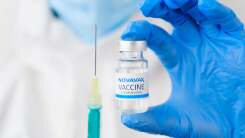Is the Novavax COVID Vaccine Actually ‘Better’?

Lots of people are hearing about Novavax, the fourth COVID vaccine option in the U.S., for the first time, but it’s been authorized for use as a primary vaccine series since early 2022. Previously, it was only available for those who hadn’t received a mRNA vaccine—an alternative for those who either couldn’t or wouldn’t get a mRNA vaccine. That news recently changed when an updated Novavax was authorized for anyone ages 12 or older in the U.S. to use as a booster, regardless of previous mRNA doses. Since all COVID vaccines are now purchased directly from manufacturers instead of through the government, you’re also seeing commercials for these vaccines, including Novavax, for the first time. It’s caused a lot of people to wonder what makes Novavax different, if it’s better than mRNA vaccines, and how they’d get it, if they wanted to.
Like many immunocompromised people, I’ve been exceptionally excited for this authorization, and hopeful for its increased efficacy. In researching this piece, I was disappointed there wasn’t more science to back up the public anticipation. What was revealed was a viable alternative option to mRNA vaccines, with roughly the same efficacy and some potential future extension of durability, if mixed and matched correctly with mRNA vaccines.
Novavax does some of the body’s homework in the vaccine process
Novavax is a protein/adjuvant vaccine, which means that a protein and an additive are used to trigger an immune response in the body. In this case, moth cells have been used to produce the protein, and the adjuvant is based on a chemical compound found in the bark of the soapbark tree (isn’t science amazing?).
The protein in the vaccine is the COVID spike protein, which, by its lonesome, does not cause COVID. The body sees the spike protein and is triggered (hopefully) to create antibodies in response that will help your body neutralize the SARS-CoV-2 virus when your body encounters it in the future. Neutralize enough virus, and you don’t get COVID-19. Even if you don’t neutralize enough to stave off a COVID infection, each neutralized virus cell means less viral load in your body, which is why vaccines reduce severe illness and hospitalizations.
The main difference between Novavax and the vaccines we’ve heard more about (Moderna and Pfizer, both mRNA vaccines) is that Novavax includes a fully formed spike protein instead of just the mRNA that codes for it. Moderna and Pfizer vaccines try to trigger the body to create the spike protein itself, whereas Novavax skips that step and just says, “here you go—enjoy your spike protein, please tip your server.” (A third vaccine, from Johnson & Johnson, was deauthorized last year and has not been replaced.)
So is Novavax “better” than mRNA vaccines?
The most honest answer is, “It’s hard to tell, yet.” The first major study of Novavax in the real world suggests little difference between its efficacy and those of Moderna and Pfizer. All three were made to target the XBB strains of COVID, and none have been tuned specifically to the later strains such as Eris or Pirola, so there’s no tangible advantage of one vaccine over another in terms of the match to circulating virus. A recent study purports that, during an Omicron wave, Novavax was about 55% effective at preventing symptoms and 28% effective at preventing infection altogether, which is comparable to what we see with Moderna and Pfizer.
Another way to consider this question is to look at efficacy rates, as given to the FDA for the emergency authorization use order, for the initial vaccine series. Since then, people have received boosters, been infected, been exposed, have sometimes mixed and matched those boosters and received more or fewer boosters, leading to the impossibility to compare efficacy side by side. Since COVID strains have also evolved through mutation, you could argue these numbers from the initial series aren’t really relevant anymore, either. For the sake of argument, Novavax was 90% effective overall against infection compared to 95% for Pfizer and Moderna at 94.1%. It is notable that efficacy of Novavax was lower in Hispanic populations, for unexplained reasons, and in older populations, a particularly at risk group.
Still, if you’ve never received a COVID vaccine and will only receive Novavax, it is 14x better than no vaccine at all.
Getting a Novavax booster when you’ve gotten Pfizer or Moderna vaccines before
Rather than original series vaccinations, which don’t even exist in the old two-dose series anymore, most of us are interested in boosters. This is why so many are excited about Novavax, because there’s been some proof along the way that mixing and matching vaccine doses produces more durable protection, so common logic might suggest mixing in a vaccine with a completely different protein delivery system to be a good idea.
What would be spectacularly useful right now is a study that showed efficacy against current variants for people who received a Novavax booster on top of a mRNA primary series, versus those who received a mRNA booster instead. A study is underway in Australia, right now, examining that, but results won’t be in until 2025.
The most interesting piece of data is this: A study from 2022 suggested that a mRNA dose following a protein-based dose might have the best durability of all. It was based on those who’d received a J&J vaccine and then switched to an mRNA booster later. While this information won’t benefit you now, if you’re about to get Novavax for the first time, it might benefit you with the next booster, if you switch back to mRNA.
How is the experience of getting Novavax different?
One reason many people express interest in Novavax is the potential of less side effects from the vaccine itself. A number of articles have suggested this may be true, based mostly on the clinical trials that Novavax conducted to receive emergency authorization from the CDC and FDA. But those trials, which show lower incidence rates of short term side effects like nausea, headache, myocarditis, and pericarditis, aren’t conclusive. Without a controlled head-on study comparing the two, there are simply too many subjective variables—such as who is evaluating these results, how many participants were involved, and their COVID infections and vaccinations—to make a direct comparison. While experts are hopeful, it’s just too early to make a firm conclusion.
It’s worth noting these are usually temporary conditions and the risk of most of these conditions people experience as side effects are much higher as a result of a COVID infection than vaccination.
How do you get Novavax, if you want to
Now that all boosters are bought commercially, finding them is a little harder than it used to be. A good place to start is vaccines.gov, and limit your selection to “Novavax.” As of mid-October, Costco had it in stock in their pharmacies across the country, and CVS has started to receive shipments.
If you are uninsured, you can still get Novavax as part of the Bridge Access Program, but there may be additional hoops to jump through, so the best option is to go to a large pharmacy chain like CVS, which handles all the paperwork on their side through a pre-existing agreement with the government.



